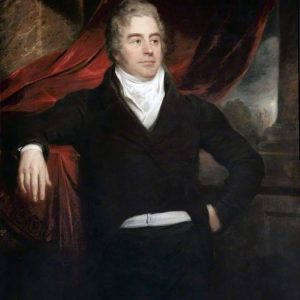John Bolton

Hanging in the Large Ballroom of Liverpool Town Hall is the portrait of John Bolton, by Joseph Allen. The plaque currently in place (pictured below) describes him as “Colonel John Bolton (1756-1839 sic), the son of an apothecary, settled in Liverpool as an apprentice to Messers Rawson and Chorley (sic) who were prominent Liverpool merchants. When war erupted again with France in 1803, Bolton raised a regiment of 800 men and equipped them at his own expense.
He was painted by Joseph Allen (1770-1839), who was born in Birmingham and trained at the Royal Academy Schools.
I think something more appropriate would read as follows:
John Bolton (1756-1837) was born in Ulverston. At the age of sixteen, he travelled to St Vincent as a penniless apprentice to the Liverpool cotton trading and slave owning firm, Rawlinson and Chorley. Within ten years of being in the West Indies, he had amassed a large fortune and returned to Liverpool, where he established himself as one of the town’s most prominent merchants. He invested in at least 69 slaving voyages as well as owning slave plantations in the Americas. Due to his great wealth, when war broke out with the French in 1803, he was able to raise a regiment of volunteers and equip them at his own expense. As a consequence, he was given the rank of colonel although never having served in the army. When slavery was abolished by the British in 1834, he received a large amount of compensation for the enslaved people he had to free.

